

A great macro lens camera and battery life helps the Macro One hold it’s own in the ridiculously competitive budget market
The Motorola One Macro is yet another of the budget phones that the Lenovo-owned brand released in 2019. It ranks as one of the lowest-priced Motorola smartphones, clocking in at £158 and represents good value for money all things considered.
The One Macro is the latest addition to the ‘One’ family and the vendor places an emphasis on macro-photography with this device.
With strong competition in the mid/budget sector from vendors such as Xiaomi, Realme and Oppo, Motorola’s rapid releases of budget devices reflect their desire to outlast their competitors.
The Macro One certainly justifies its price, but ultimately fails to outperform some of the other phones available for slightly higher prices on the market.
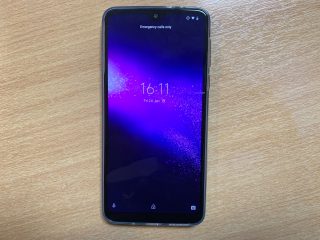
Design
The phone has a fairly basic appearance and at this point, we don’t expect too much in terms of innovation from budget phones when it comes to aesthetics.
The back of the Motorola One Macro is a reflective blue that gives the phone a glossy look and looked very impressive when I first opened the box. The smartphone also comes with a translucent case to protect the phone which was a nice surprise although it does take away from its overall look.
And I soon found that the case was imperative as I found that the phone is prone to fingerprint smudges and tiny scratches, particularly on the back of the phone, when not fully covered.
The fingerprint scanner is located on the back of the phone and works about as quickly as the G8 Plus that I reviewed last year. The headphone jack is on the top of the phone which sometimes made my gaming experience uncomfortable as it seemed an awkward spot to play games like PUBG and Call of Duty so I was forced to switch to a wireless alternative. I had the same problem with the G8 Plus last year and it seems that Motorola won’t be changing the positioning of the headphone slot anytime soon. Still, it’s refreshing that they have a headphone jack at all.
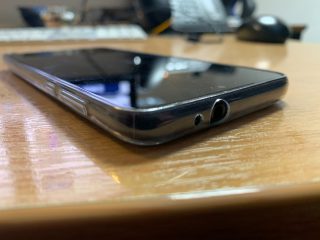 The display of the phone is also fairly standard. The smartphone has a 6.2-inch display with an HD resolution which is slightly disappointing given that other vendors are offering an FHD+ unit at a similar price point.
The display of the phone is also fairly standard. The smartphone has a 6.2-inch display with an HD resolution which is slightly disappointing given that other vendors are offering an FHD+ unit at a similar price point.
I found the auto-brightness feature to be somewhat of a hindrance when on Netflix as I feel at times the phone would become too bright when I was watching in dark rooms. Although the One Macro works reasonably well for Netflix and YouTube videos and I didn’t have any major problems beyond this when binge-watching the latest season of Jack Ryan.
Hardware Specs:
- OS: Android 9.0
- Screen: 6.2 inches
- Resolution: 720 x 1520 pixels
- Memory: 4GB
- Internal storage: 64GB
- External storage: microSD
- Water resistance: Splash resistant
- Rear camera: Triple 13MP
- Front camera: 8MP
- Video: 1080p @ 30/60/120 fps
- Battery: 4000mAh
- Connectivity: 4G, WiFi, Bluetooth 4.2
- Dimensions: 157.6 x 75.4 x 9 mm
- Weight: 186g
Camera
The camera is where the Motorola One Macro intends to shine. The phone has a triple-camera set up on the back of the phone and has a 13MP primary lens as well as a 2MP depth sensor.
The features include everything we’ve we’ve come to expect from budget Motorola devices including a portrait mode. However. The differentiating factor between this smartphone and other budget phones on the market is, of course, the macro lens.
The macro lens allows users to get within 2.5 cm of the subject and allows for great close-up shots. This is the best in class in terms of performance with the closest competitor being the Realme 5 Pro which allows for 4 cm of space between the photographer and the subject.
This feature was mightily impressive and is a great attribute to have for a budget device and I imagine other vendors will slowly begin to follow suit. The autofocus of the macro lens was especially great and took next to no time to adjust. Some of the images I took with the macro lens can be found below:



However, as good as the macro lens camera feature was, the regular camera leaves a lot to be desired. The images I captured with the regular camera appeared grainy and lacked focus despite me clicking the screen several times.
The difference between the macro lens and the regular lens is pretty substantial. Some of the pictures I took with the regular camera can be found below:
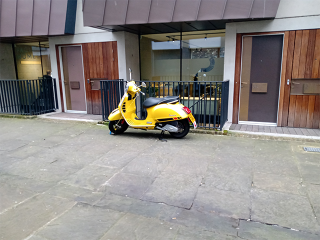
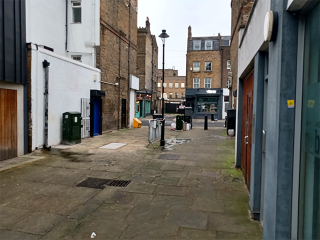
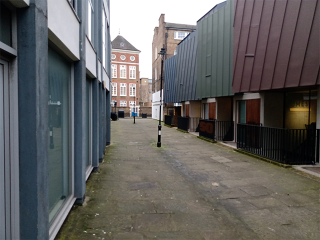
Key selling points
- Great battery life
- Fantastic for macro-photography
- Budget price
- Fast fingerprint scanner
- Solid performance for the price
The daily performance of the phone can be described as dependable. It didn’t exceed my expectations by any means but it did certainly meet them in many aspects. You get 64GB of storage with the phone despite other budget devices having 128GB available but this can be expanded with the MicroSD slot. The Snapdragon 665 gives it a decent gaming performance, which is near identical to the G8 Plus and the Xiaomi Redmi Note 8. Games like PUBG ran smoothly without any significant bugs.
The smartphone certainly flourishes with its 4000mAh battery life which lasts for a full day and a half with just one full charge. The Macro One doesn’t come with fast-charging and it does take a few hours for a full charge but once it gets there, the phone packs some serious stamina.
At a glance
- Speed: 3/5
- Camera: 3.5/5
- Battery: 4/5
- Design: 3/5
- Value: 4/5
Overall, the Macro One plus delivers what it sets out to do – deliver a budget phone that allows users to take great close-up photographs. Whilst it achieves it’s main aim, delivers a great battery life and just about delivers in terms of specs it also leaves much to be desired.
The smartphone lacks when it comes to its regular camera which is confusing since the macro lens is one of the best parts of the phone. It doesn’t deliver outstanding specs like the Realme 5 Pro but still holds it’s own while being cheaper than some of the other budget devices on the market today.
The phone retails at £158







